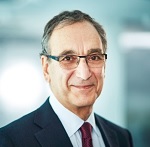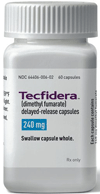 |
| Biogen CEO George Scangos |
In big biopharma land, many CEOs like to see a blend of high-risk breakthrough drugs with megablockbuster potential and a few relatively low-risk projects in the late-stage pipeline. But following a swift elimination of some 880 jobs, Biogen CEO George Scangos and his team are now focused primarily on two home run swings in an R&D game that will take years to play out. And that has analysts betting Biogen will start doing some late-stage biotech deals or face continued speculation that the big biotech will become a target itself.
"We don't believe in incrementalism here," Biogen Chief Medical Officer Dr. Alfred Sandrock Jr. told analysts last week, according to a report in today's Boston Globe. "We want to make big differences in these serious diseases."
Sandrock's stature at the company has grown steadily over the years, highlighted by his expanded authority in the wake of Doug Williams' recent departure as head of R&D. He's been in charge of downsizing pockets of the R&D group over the past few years and helped guide Biogen's ($BIIB) decision to drop immunology and fibrosis R&D in the restructuring.
The company has put the R&D spotlight squarely on Alzheimer's--a $2.5 billion program--and multiple sclerosis. The Alzheimer's work includes two early-stage drugs, the amyloid beta drug BAN2401 and its BACE drug E2609, both with early readouts due next year. Late-stage efforts include a drug for spinal muscular atrophy with a separate effort waiting in the wings for inflammatory bowel disease.
But two big programs loom particularly large at Biogen: the aducanumab program for Alzheimer's, and anti-LINGO-1, which aims at remyelination, a big goal in the MS field. Anti-LINGO-1's focus, though, is still centered on midstage results. And that makes the long, rocky road ahead in Alzheimer's as the top late-stage effort at Biogen.
Biogen's R&D team recently opted to shift the focus somewhat for the two Phase III studies for aducanumab, looking to recruit a large patient group at an earlier stage of disease development. That fits squarely with the industry's take that thwarting the disease has to occur before Alzheimer's causes brain damage. But near term Biogen will only have more early stage data for their top pipeline drug, leaving any final readout for Phase III years ahead. A positive Phase III would position Biogen for a megamarket payoff that could hit $10 billion or more a year. But most analysts who have seen a 99% failure rate in this field over the past decade--along with some troubling new Phase I data that came out earlier this year--aren't adding such big numbers to their financial models. They want to see the final data, well down the road in 2020.
 With the company's crucial Tecfidera franchise under stress, analysts have been all but demanding that Biogen get busy and buy something, preferably something in the multibillion-dollar range that can bring in a late-stage asset or two that creates new, more near term catalysts for the company.
With the company's crucial Tecfidera franchise under stress, analysts have been all but demanding that Biogen get busy and buy something, preferably something in the multibillion-dollar range that can bring in a late-stage asset or two that creates new, more near term catalysts for the company.
"We don't feel compelled to do any deals," Scangos told the Globe. But that remark followed a comment that Biogen is looking "at everything."
Back in July, when the numbers soured and the stock headed south, Scangos was much more assertive in laying out the company's strategy to analysts.
"We certainly are, I would say, increasingly aggressive about wanting to add additional compounds to our portfolio and our pipeline," noted Scangos. "I think you can count on that. … I don't think we're in a panic situation," he added after being pressed on executing on the M&A front. But with a good balance sheet and the ability to take on considerable debt, the CEO asserted, the company will be aggressive.
With long shots at Alzheimer's and MS drugs playing out years down the line, about the only tactic that Scangos has to keep investors interested is M&A.
- here's the story from the Globe
Special Report: 15 Highest-Paid Biopharma CEOs of 2013 - George Scangos - Biogen Idec